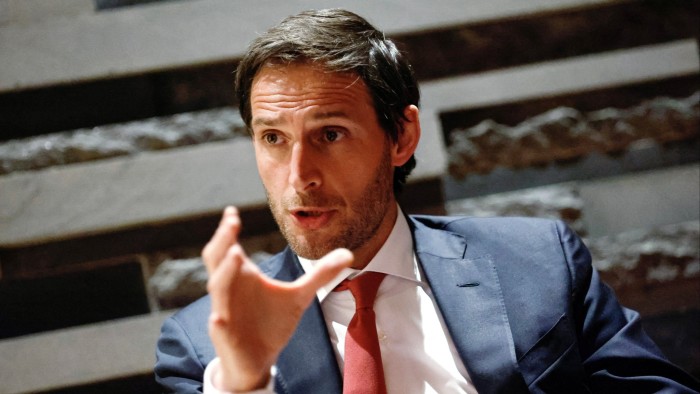Unlock the Editor’s Digest for free
Roula Khalaf, Editor of the FT, selects her favourite stories in this weekly newsletter.
More than 80 per cent of EU companies eligible for a new carbon border tax will be exempted under reforms planned by Brussels, tax commissioner Wopke Hoekstra has said.
Hoekstra told the FT he wanted to restrict the carbon border adjustment mechanism (CBAM) to the biggest importers and spare most businesses the costs of compliance and charges as part of the bloc’s push to cut red tape and boost productivity.
“Less than 20 per cent of the companies in scope are responsible for more than 95 per cent of the emissions in the products,” he said.
“It doesn’t do anything to [diminish] the importance of the climate objectives, but it is a way to make life much easier for a wide range of companies across the continent.”
The move would free up to 180,000 of the 200,000 businesses affected from complying.
European companies have complained about the complicated and costly form-filling during a trial run of CBAM, which aims to protect heavy industry in the EU — a sector that already has to pay for its greenhouse gas emissions.
It obliges importers in seven sectors including aluminium, steel, iron and fertilisers to report the carbon content of their products. From next year they must then pay the difference between the price of emitting the carbon in the EU and in the country in which it was made.
Since few countries have EU-style emissions trading schemes, or calculate carbon content, the scheme has proved onerous for EU importers.
A report in March found that only about 10 per cent of companies in Germany and Sweden expected to report emissions had done so.
“It is common sense that if you happen to not be part of the scope, then there’s also little point in having you fill out a lot of paperwork,” said Hoekstra.
The world-first system has been heavily attacked by trading partners such as the US and India, whose companies are likely to be charged the tax by importers.
But EU officials insist the aim of the latest reforms is to help EU businesses and not water down the impact, since more than 95 per cent of imports would still be covered.
They also hope it will convince countries to implement their own carbon trading systems.
The Dutchman will consult on the move, and hopes it can be enacted through a giant “omnibus” simplification act expected this month. It must be approved by a majority of member states and members of the European parliament.
Brussels has pledged to cut red tape by 25 per cent — and 35 per cent for small businesses — to boost economic growth and investment and close the growing gap with the US and China.
This year Hoekstra will carry out a separate review of CBAM, which applies to cement, aluminium, electricity and hydrogen. It could be extended to other sectors such as glass, ceramics, pulp, paper and bulk chemicals.
The steel industry is lobbying for greater protection. It wants an exemption for EU-made goods exported outside the EU, processed abroad and subsequently reimported into the EU. It also wants it to cover steel components such as girders and aircraft parts.
“We’re going to carefully look at the scope,” Hoekstra said. “We’re carefully going to look at the exports. We’re going to do it with an open mind but also knowing that this is not necessarily easy.”
Read the full article here




